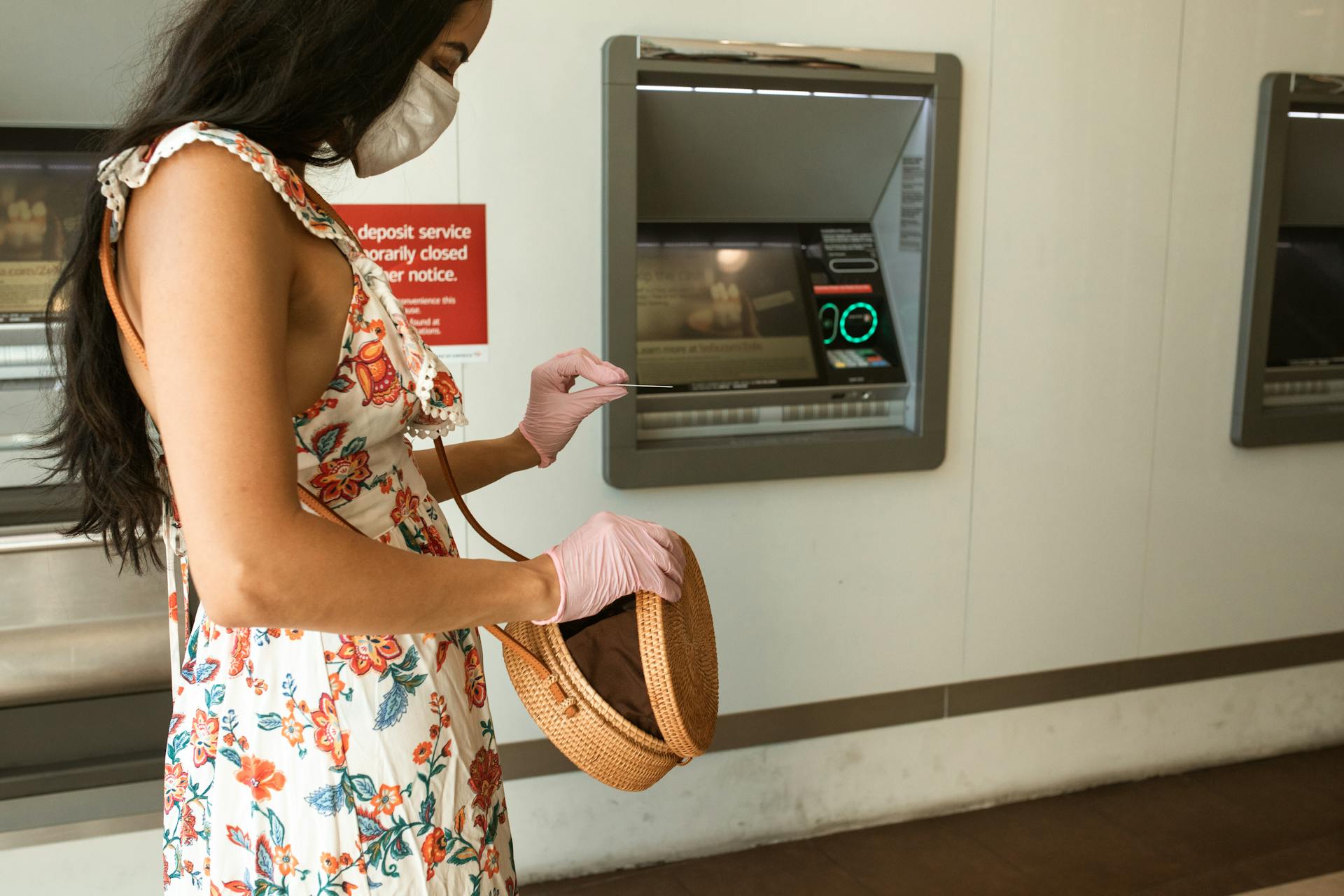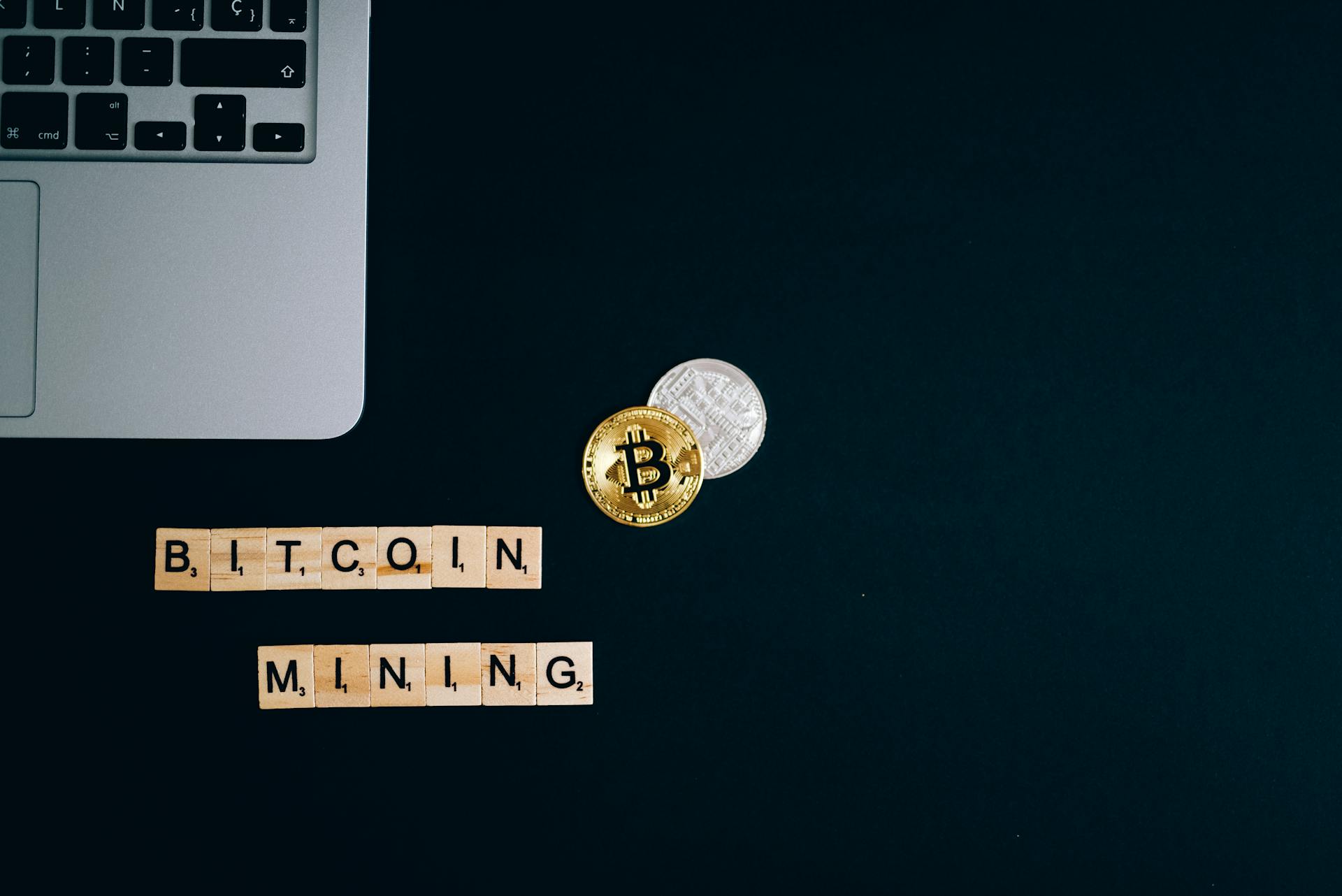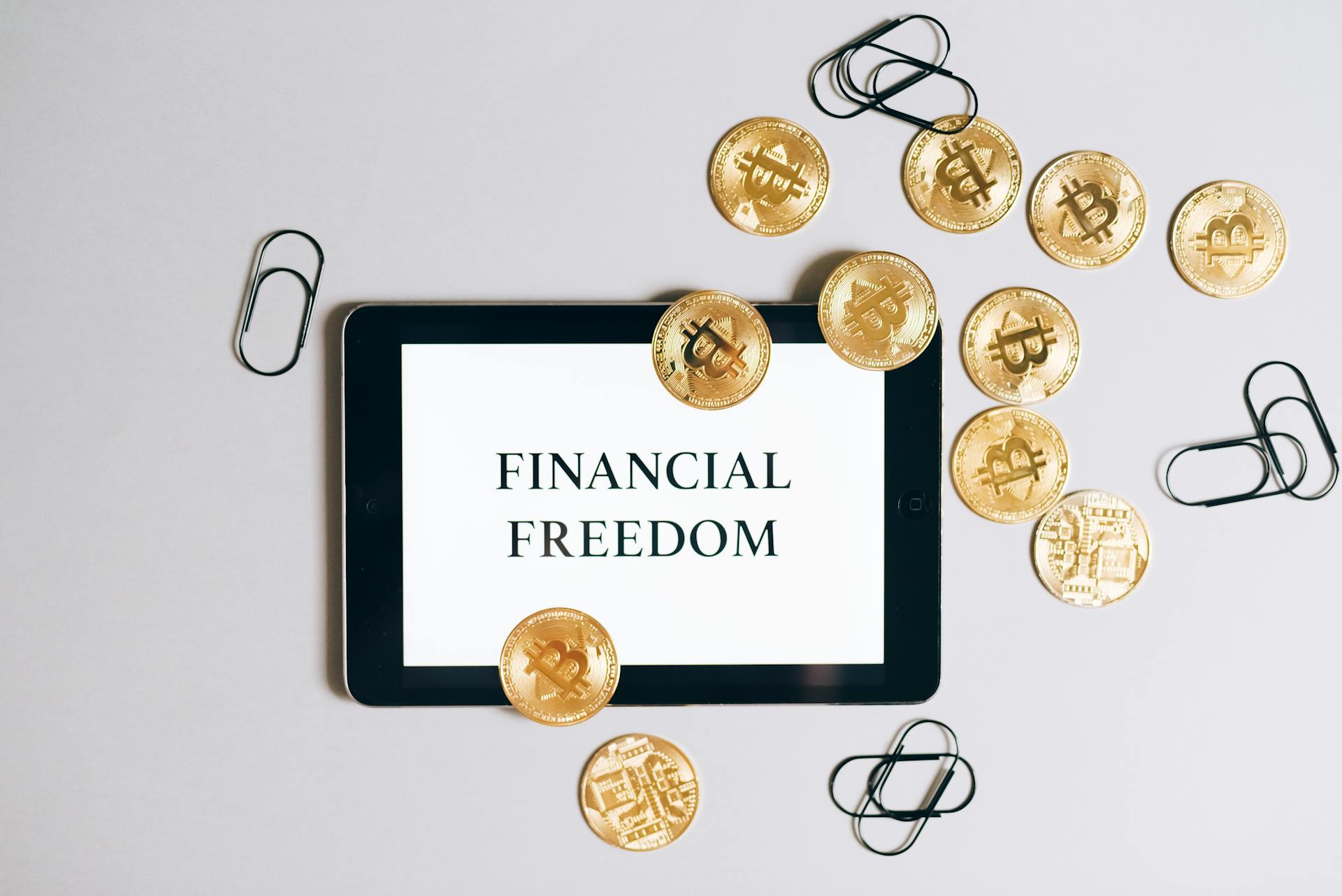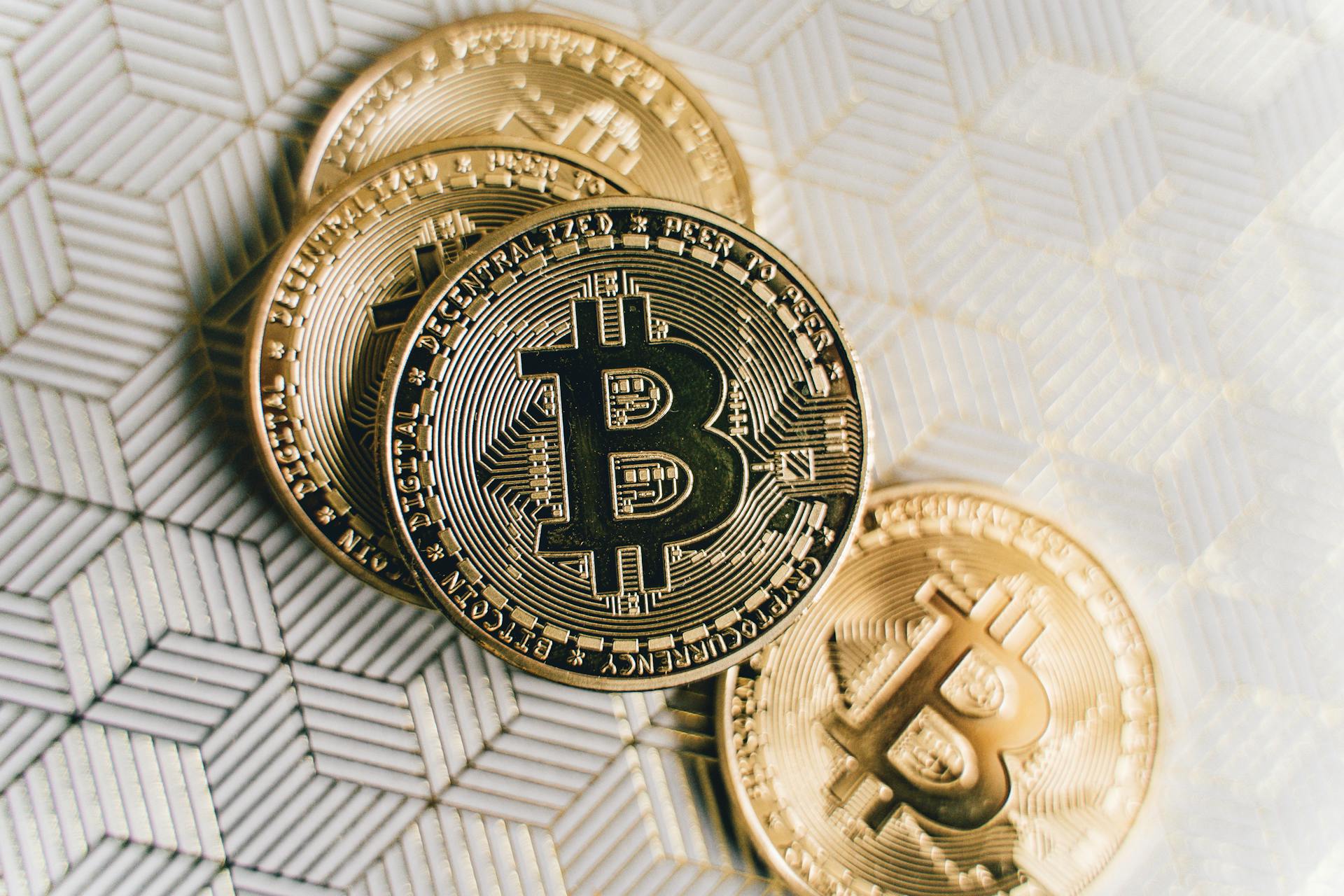
Nigeria's Bitcoin adoption is on the rise, with a significant increase in the number of users and transactions. This trend is largely driven by the country's struggling economy and limited access to traditional banking services.
Many Nigerians are turning to Bitcoin as a way to store their wealth and send money to family and friends across the border. In fact, a survey found that 70% of Nigerians believe Bitcoin is a better store of value than the Naira.
The ease of using Bitcoin for cross-border transactions is a major draw for Nigerians, with many using platforms like P2P exchange to buy and sell Bitcoin with others. This has led to a significant increase in the number of Bitcoin transactions in Nigeria, with some reports suggesting a 300% increase in the past year.
Expand your knowledge: Bitcoins Transactions per Second
What is Bitcoin?
Bitcoin is a digital currency that allows for peer-to-peer transactions without the need for a central authority. It was created in 2008 by an individual or group using the pseudonym Satoshi Nakamoto.
Discover more: Peer-to-peer Crypto Exchange
Bitcoin uses a decentralized system, meaning that transactions are recorded on a public ledger called the blockchain, which is maintained by a network of computers around the world. This ledger is transparent and tamper-proof.
Transactions are made by sending and receiving Bitcoins, which are created through a process called mining. Mining involves solving complex mathematical problems to validate transactions and add them to the blockchain.
The total supply of Bitcoins is capped at 21 million, which helps to prevent inflation.
For more insights, see: What Is Bitcoins Blockchain
Legality and Regulation
The Central Bank of Nigeria (CBN) has the sole right to issue Nigeria's legal tender, the Naira, and determine its exchange rate to other fiat currencies.
According to the Central Bank of Nigeria Act 2007, there is no legal framework addressing cryptocurrencies, and they cannot be considered legal tender.
In 2017, the CBN banned banks from facilitating transactions related to cryptocurrencies, but this ban was not heavily enforced.
The CBN and Securities and Exchange Commission (SEC) have issued warnings about the risks of investing in cryptocurrencies, but these warnings are designed to educate citizens about the risks rather than ban cryptocurrencies outright.
Expand your knowledge: Cryptocurrency in Nigeria
Cryptocurrency-related companies are not forbidden in Nigeria, and the legal status of cryptocurrencies is ambiguous.
The SEC has taken steps to regulate cryptocurrencies, while the CBN has issued directives and guidance to regulated entities, including banks and other financial institutions.
Here is a summary of the regulators involved in regulating cryptocurrencies in Nigeria:
The CBN's approach to regulating cryptocurrencies has been in the form of issuing directives and guidance to regulated entities, rather than a clear ban.
In 2021, Nigerians reportedly had their bank accounts frozen due to being involved in activities with cryptocurrencies.
The CBN cited its need to protect the public from threats by unregulated activities that are potential areas of illegal operations.
Nigeria's regulatory framework for cryptocurrencies is still evolving, and the government has announced plans to introduce a new regulatory framework in May 2024.
Impact and Adoption
Bitcoin's rising popularity in Nigeria is a fascinating phenomenon. The Chartered Institute of Bankers of Nigeria (CIBN) reported that bitcoin is booming in Nigeria despite the central bank's anti-crypto stance.
Related reading: Ecobank Nigeria
Despite government warnings, the people of Nigeria are undeterred. The CBN has declared that digital currencies are not legal tender, but this hasn't stopped Nigerians from embracing bitcoin.
Nigeria's agricultural and education sectors could benefit significantly from cryptocurrencies. Researchers at the CBN suggest that blockchains have the potential to enhance access to finance and remedy food security issues.
Impact
Cryptocurrencies could have a significant positive effect on the agricultural sector in Nigeria, particularly in terms of enhancing access to finance for farmers.
Researchers at the CBN suggest that blockchains could remedy food security issues by connecting the technology to farmers' business models.
In the education sector, incorporating cryptocurrency into the curriculum could be beneficial for the development of the country, as there is much to learn about them.
By teaching cryptocurrency, students can gain valuable knowledge and skills that can be applied in various aspects of life, including economics and finance.
A different take: Decentralized Finance Courses
Bitcoin Adoption on the Rise
Bitcoin's adoption is on the rise, particularly in Nigeria. The country's central bank, the CBN, has expressed concerns about the potential impact of cryptocurrencies on monetary policy, but researchers suggest that they could have a positive effect on the agricultural and education sectors.
The agricultural sector could benefit from blockchains, which could enhance access to finance and remedy food security issues. This is because blockchains can connect technology to business models, making it easier for farmers to access finance.
Bitcoin is booming in Nigeria, despite the central bank's anti-crypto stance. The Chartered Institute of Bankers of Nigeria highlighted this trend in its December 2019 edition of 'The Nigerian Banker'.
Nigeria and South Africa have been ranked as the top countries for Bitcoin adoption, with the majority of the population aware of the cryptocurrency. This has led Binance to list Nigeria's fiat currency, the Naira, as the first fiat-to-crypto trading pair on its platform.
The Nigerian Senate has also tried to discourage the use of Bitcoin, but it seems that the people are not deterred by the government's stance. The ongoing economic disparity has driven many people to seek alternative financial options, including cryptocurrencies.
Curious to learn more? Check out: Bitcoins and Blockchains
Management and Effectiveness
Managing your Nigeria Bitcoins effectively requires a solid understanding of the local regulations. The Central Bank of Nigeria has explicitly prohibited financial institutions from dealing in cryptocurrencies, including Bitcoin.
You can still buy and sell Bitcoins in Nigeria, but it's essential to use reputable and licensed exchanges. The exchange, NairaEx, is a popular choice among Nigerian Bitcoin traders.
To avoid falling victim to scams, be cautious of exchanges that ask for your personal or financial information. According to the article, some exchanges require users to provide their bank account details to complete a transaction.
Setting clear financial goals is crucial for effective Bitcoin management. The article suggests setting a budget and sticking to it to avoid overspending on Bitcoin.
Regularly monitoring your Bitcoin wallet is also vital to prevent unauthorized transactions. The article recommends checking your wallet balance and transaction history daily.
In Nigeria, Bitcoin is not considered a legal tender, but it can still be used as a store of value or for online transactions. The article notes that some businesses in Nigeria accept Bitcoin as a form of payment.
To stay up-to-date with the latest developments in Nigeria's Bitcoin scene, follow reputable news sources and online forums. The article recommends joining online communities to connect with other Bitcoin enthusiasts and stay informed about market trends.
Related reading: Bitcoin Atm Milwaukee - Coinhub
Frequently Asked Questions
Is bitcoin available in Nigeria?
Yes, Bitcoin is available in Nigeria, with options to buy through crypto exchanges like Bitget and peer-to-peer platforms. You can trade Bitcoin directly with other users using the Nigerian Naira (NGN).
How much is $1 bitcoin in Nigeria?
As of now, 1 Bitcoin is equivalent to approximately 146 million Nigerian Naira. To buy 1 Bitcoin, you would need to spend around 146 million NGN.
Sources
- https://en.wikipedia.org/wiki/Cryptocurrency_in_Nigeria
- https://theconversation.com/naira-is-in-crisis-but-cryptocurrency-isnt-to-blame-nigeria-needs-consistent-policy-230389
- https://www.voanews.com/a/nigeria-s-cryptocurrency-crackdown-will-have-consequences-experts-say/7523302.html
- https://www.ibanet.org/Updated-overview-of-Nigerian-cryptocurrency-landscape
- https://bitcoinist.com/bitcoin-usage-in-nigeria-surging-despite-govt-caveats/
Featured Images: pexels.com


